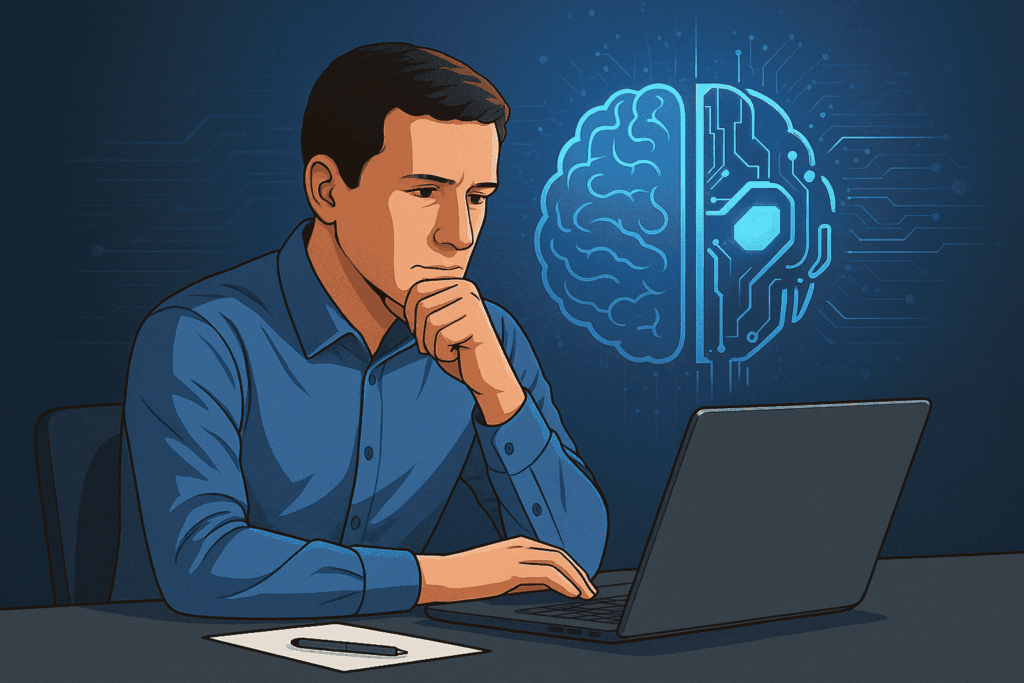
『 ZORO 』
8 months ago
AI and the Mind: Is It a Shortcut or Superpower for Human Thinking?
Recent research shows AI tools significantly speed up decision-making and learning. But psychologists warn about the risk of cognitive laziness and overreliance. Understanding this balance is crucial as AI becomes our mental companion.

🔍 What Is Meant by “AI and the Mind”?
When we talk about AI and the mind, we refer to how AI enhances or affects cognitive processes—thinking, reasoning, creativity, and memory. These tools can assist with:
- Rapid recall of facts
- Generating ideas and problem-solving
- Real-time language translation
- Automated writing and editing
But are humans outsourcing their thinking entirely, or using AI as a cognitive extension?
⚡ Why It Matters Across Sectors
🏫 Education
Students using AI for homework and research benefit from instant insights. Genevieve Smith of Stanford University notes, “AI can democratize learning—but risk reducing depth of understanding.”
💼 Workplace Productivity
In business, AI speeds tasks like drafting reports, encoding data, and summarizing documents. Some firms report a 30% increase in productivity—but struggle to maintain creative thinking.
📈 How AI Becomes Both Shortcut and Superpower
✅ AI as a Shortcut
- Overconsumption of AI summaries leads to superficial understanding
- Memory erosion when AI is always relied upon
- Biases in AI outputs can reinforce misinformation unknowingly
🚀 AI as a Superpower
- Rapid brainstorming and ideation with AI “co-pilots”
- Complex problem-solving using pattern recognition
- Enhanced accessibility for non-experts via simplified AI interfaces
🧠 Expert Perspectives
Cassie Kozyrkov, former Chief Decision Scientist at Google, warns:
“If AI becomes our default thinker, we lose the muscle of critical reasoning.”
Meanwhile, Dr. Eliana Green, cognitive neuroscientist, says:
“AI can be a cognitive prosthetic—but only if we use it intentionally.”
🧩 Striking the Right Balance
Experts propose guidelines to manage AI and the mind effectively:
- Human-in-the-loop: Always vet AI outputs
- Cognitive hygiene: Alternate between AI use and self-reliant thinking
- Education redesign: Teach critical engagement with AI tools early
- Transparency rules: Know AI’s data, biases, and reasoning methods
📘 Conclusion: The Mindful Path Forward
The integration of AI and the mind offers extraordinary promise—and poses real risks. AI can amplify intelligence, creativity, and productivity. Yet, without conscious use, it may weaken the very skills it was meant to enhance.
As AI becomes a cognitive partner, adopting mindful usage, critical awareness, and balanced learning will be essential. Ultimately, humans must stay in the driver’s seat—even if AI provides the horsepower.
📚 For more insightful news on AI advancements and technology trends, visit AI CERT's News.
AI CERTs offers a wide range of industry-recognized certifications designed to boost your career in artificial intelligence and blockchain technology. Whether you're an executive, developer, or business professional, Educator our specialized certifications, such as AI+ Project Manager™ and AI+ Developer™, AI+ Educator™will empower you with the knowledge and skills to excel in this rapidly evolving field. Gain practical expertise, earn globally recognized credentials, and take your career to the next level with AI CERTs! Visit AI CERTs Certifications to explore more.
Sources-
https://www.psychologytoday.com/us/blog/consumed/202507/ai-and-the-mind-shortcut-or-superpower



